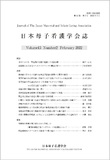Japanese
English
- 有料閲覧
- Abstract 文献概要
- 参考文献 Reference
抄録
【目的】妊娠中の超音波検査により、胎児に先天性心疾患があると診断された母親の妊娠中の体験を明らかに すること。
【方法】質的記述的研究。協力の得られた母親7名に1対1の半構造化面接を実施した。胎児に先天性心疾患があると診断を受けた経験について自由に語ってもらった内容から、出来事が同じである語りを時系列で結び、文脈のある物語にまとめ記述した。
【結果】7名の母親の体験をまとめると、1)初めて胎児の先天性心疾患を疑われた時、2)初めて胎児の先天性心疾患を疑われた時から確定診断を受けた時、3)確定診断を受けた時、4)確定診断を受けた時から出産、5)出産、6)出産から産後1ヵ月頃まで、7)産後1ヵ月頃から現在までの7つの時期が抽出された。本研究では 1)〜 4)までを記述した。超音波検査により胎児の先天性心疾患を診断された母親の体験には《心臓病=死》という最悪のイメージが存在していた。しかし、胎児が生きられるということを認識した頃に“転換期”と言える時期が存在し、悲観的な体験から、胎児や病気と向き合い、前を向こうと努力するようになっていたことが明らかとなった。一方で、悲観的な体験と前向きな体験は、常に混在していることも明らかとなった。また、母親の体験には、日常的に行われている超音波検査、五体満足が当たり前という考え、胎児の明るい未来を想像できるようになること、母親としてできることを見つけられることが大きく影響しているということが推察された。
【結語】母親たちは“転換期”を経験しながらも、前向きな体験と、悲観的な体験が混在していた。このような母親に対し、看護職者に期待される主な役割は、寄り添い相談にのること、適切な情報提供のために調整することであると示唆された。
【Purpose】To clarify the experiences of mothers whose fetuses were diagnosed with congenital heart disease by ultrasound during pregnancy.
【Methods】This was a qualitative descriptive study. One-on-one semi-structured interviews were conducted with 7 mothers who agreed to participate. They spoke freely about the experience of being told that their fetuses had been diagnosed with a congenital heart disease. From this, we grouped similar events in a time series and summarized the narratives in context.
【Results】Seven time periods were extracted from the 7 mothers' experiences: 1) when it was first suspected the fetus had a congenital heart disease, 2) from when congenital heart disease was first suspected to when a definitive diagnosis was made, 3) when the definitive diagnosis was received, 4) from the definitive diagnosis to delivery, 5) delivery, 6) from delivery to about 1 month later, and 7) from about 1 month later to the present time. This study describes the experiences in periods from 1 to 4. Among the mothers having a fetus diagnosed with congenital heart disease by ultrasonography, some envisioned a worst-case scenario that "heart disease = death". However, there was what can be called a "turning point" when they realized it was possible for the fetus to survive. The experience then changed from one of pessimism, to trying to come to terms with their fetus and the disease and to move forward. Overall, the experience was a constant mix of pessimism and optimism. Moreover, because regular ultrasound examinations are assumed to confirm that the fetus is healthy, we believe the mothers' experiences are greatly influenced by them being able to imagine a bright future for the fetus and by thinking of things they could do as a mother.
【Conclusions】Although mothers experienced a "turning point," their experiences were a mix of optimism and pessimism. This study suggests that for these mothers, the main role expected of nurses is to provide close consultations and to offer appropriate information.
Copyright © 2022, The Japan Maternal and Infant Caring Association All rights reserved.


